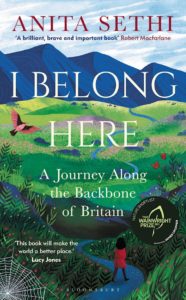Book Review – August 2021
Warning: This review includes a quote of the racist expletives used by the perpetrator of a hate crime.
 According to the CPRE, just 1% of visitors to England’s National Parks and Areas of Outstanding Natural Beauty are people from black, Asian or minority ethnic backgrounds. Yet the 2011 national census established that just over 14% of England’s population identified as part of these ethnic groups.
According to the CPRE, just 1% of visitors to England’s National Parks and Areas of Outstanding Natural Beauty are people from black, Asian or minority ethnic backgrounds. Yet the 2011 national census established that just over 14% of England’s population identified as part of these ethnic groups.
This can partly be explained, perhaps, by the paucity of public transport links between the England’s urban centres of population and it’s rural areas. Our cities tend to be the places where less affluent people, many of whom are from black, Asian or minority ethnic backgrounds, live and the lack of public transport presents a significant barrier to their ability to access the countryside.
But there is another, more insidious, explanation. All too often people of colour are made to feel that they do not belong in England’s countryside; that it is a place that is not for ‘people like them’. Anita Sethi was forced to confront this corrosive notion when she was subjected to a sustained attack of racial abuse and hatred on a busy train between Liverpool and Newcastle in 2019.
Sethi is a Manchester-born writer, a proud Northern lass who also celebrates her Asian, East African and Caribbean heritage. The perpetrator of the attack against her was subsequently arrested and prosecuted. But the wounds his words inflicted on Sethi were deep and took a long time to even begin to heal. Her attacker had questioned her very right to live in the country of her birth. He told her, in the most violent language, that she did not belong:
Do you have a British passport? Get back on the banana boat. Paki cunt. Fuck off!
Sethi was brought up in Manchester by her mother, a single mum. There wasn’t much money around in her childhood home, nor did the family ever have expensive holidays. But Sethi vividly remembers once staying in the Lake District as a girl and the sense of wonder she experienced when contemplating the open expanses of hills, lakes and sky. Then, as an adult plying her trade as a writer and living in rented accommodation in Manchester and then London, Sethi always looked forward to the sense of relief, the ability to breathe, that came from managing to get out into the countryside.
It was natural, then, that she should seek to heal the wounds of the incident on the train by going out into the wilds and walking. She sensed, almost instinctively, that there was healing to be found in the landscape. It was also natural that the long-distance walk that Sethi decided upon, as a woman from the North, was a journey along the northern backbone of England: the Pennines.
 As she walks Sethi tells us about her life and about that of her ancestors who were forcibly recruited as indentured labourers in British India and set to work in Britain’s colonies in East Africa and Guyana. The British Empire was not built solely on trading goods and commodities, but relied on shipping people from one place to another for the purposes of hard, brutal labour. She ties in her own experiences as a British woman of colour with the wider picture of Black Lives Matter and the word-wide ripples of the murder of George Floyd in 2020.
As she walks Sethi tells us about her life and about that of her ancestors who were forcibly recruited as indentured labourers in British India and set to work in Britain’s colonies in East Africa and Guyana. The British Empire was not built solely on trading goods and commodities, but relied on shipping people from one place to another for the purposes of hard, brutal labour. She ties in her own experiences as a British woman of colour with the wider picture of Black Lives Matter and the word-wide ripples of the murder of George Floyd in 2020.
The hate attack on the train was not an isolated incident for Sethi: she has been on the receiving end of racial abuse on regular occasions both as a child and as an adult. Just as upsetting were the people who tried to downplay the hurt that these words inflicted; the white people who tried to convince her this was not really racism. This is ‘gaslighting’, in other words:
the attempt to manipulate the truth by invalidating someone’s experience and presenting a false version of reality.
Reading I Belong Here, it is clear that Sethi is fascinated by language. She explores the multiple uses and meanings of seemingly simple words like ‘skin’ and ‘backbone’ and delves deeply into the history and significance of the weaponised words ‘Paki’ and ‘banana boats’ that her train carriage persecutor taunted her with.
Sethi’s feel for the landscape she walks through is acute and her descriptions are vivid and poetic. But there is nothing pretentious about her nature writing; she confesses that she does not know the names of all of the trees and plants she observes, but that does not prevent her enjoyment of their beauty, nor her ability to share that joy with the reader.
In a similar vein, although she loves walking, Sethi admits that she is not a hardened hillwalker: her feet, at the start of the walk at least, are soft and she does not possess a collection of fancy walking gear. But she does, she discovers, possess a well of grit and determination and seems to draw strength from the hills and moorland that she walks through. Sethi is also buoyed by the encouragement of strangers; their smiles, their nods and their friendly conversations.
Near the end of her journey, walking on the Pennine Way, Sethi feels a sense of belonging as she sits down and looks out over Hull Pot, an enormous collapsed limestone cavern on the slopes of Pen-y-ghent:
I sit down for a while and gaze at the landscape and breathe. I knew that journeying through the North had something to offer up to me. I felt it calling to me. Go back to where you’re from. This is where I’m from. I’m from the North. The glorious North.

A powerful review of what is clearly a powerful book; one that needed to be written. And needs to be read. Thank you.
Thanks Mark, I appreciate your feedback.
I did enjoy this book and I think you represent it well, however I did find it could have done with an editor as it circled around, gave big wodges of information and mulled on particular words. There was a great book waiting to be brought out from a decent book, and I’m not sure her publishers did her justice. Such an important book to be written and published, though, however flawed.
Thanks Liz. Indeed, where would we be without good editors?